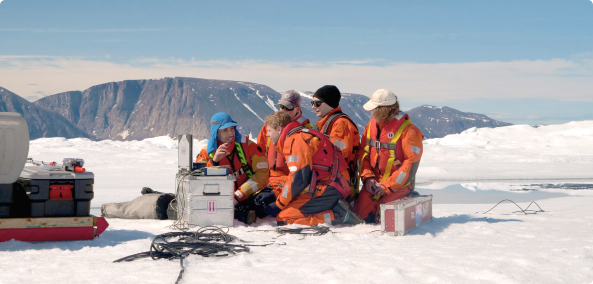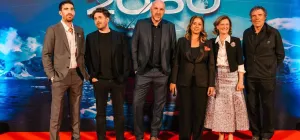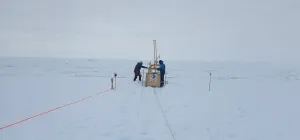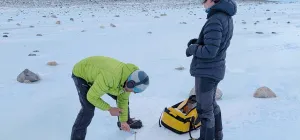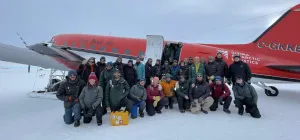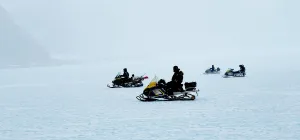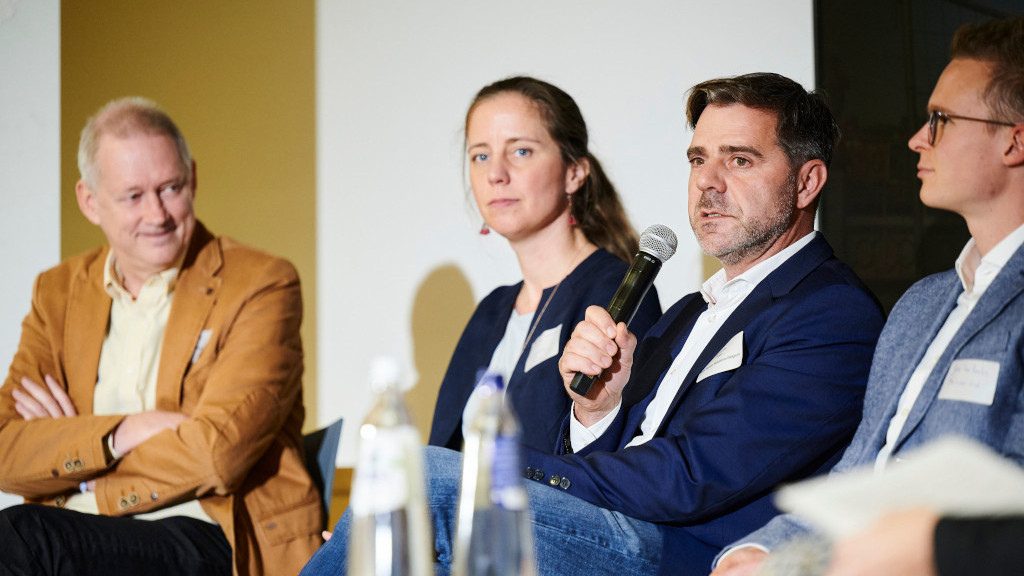
On Wednesday, October 19th, more than 500 students and space professionals gathered in Brussels for the third edition of Switch To Space, Belgium’s largest biannual space technology gathering.
Together with nearly 100 online attendees, everyone was immersed in an array of new technologies and developments from the space sector, through panel discussions and presentations of all stakeholders in the sector.
The International Polar Foundation was invited to participate in a plenary panel session, moderated by ESA’s Education Administrator Natacha Callens, discussing how Moon and Mars explorations can benefit society on Earth. The panel consisted of astronaut Frank De Winne (Head of the European Astronaut Center) Koen Vriesacker (Techtransfer Broker for the Belgian Space Solutions Center), Jan Van Baelen, (Founder and CEO at The Lunar Grid), and Mieke Sterken (Education & Outreach Coordinator at the International Polar Foundation).
The panel discussed the current challenges for interplanetary manned space explorations such as the scarcity of vital resources like oxygen, water, energy, and fresh food. They also emphasized the challenges of long-term confinement, altered circadian rhythms, exposure to radiation, limited means for communication, and the implications these have on mental health and sociological organisation.
Meeting the challenge
In the search to overcome these challenges, researchers and engineers take a step-by-step approach, doing scientific research, developing new technologies, and testing them on Earth. As a terrestrial analogue for Moon and Mars missions, Antarctica is considered to be the best testing area, given its below-zero average temperatures, remoteness, thinner atmosphere, unusual day-night cycles, and extremely harsh environment.
With its self-sufficient zero-emission design and its highly effective water treatment system, the Princess Elisabeth Antarctica (and life therein) has many similarities with space habitats. Technological developments in Antarctica and in space can be seen as parallels, continuously evolving through adaptations or unique combinations of existing technologies, which are often fairly straightforward but preferred because of their robustness - when it comes to vital life support systems. This contrasts with the sometimes very sophisticated or high-tech scientific experiments or instruments being tested in space, as Frank De Winne mentioned.
The panel also discussed closed- or semi-closed loop systems, like the Princess Elisabeth Antarctica water treatment system and the EDEN ISS astrobiology lab at Neumayer Station. They also emphasized the importance of sociological, medical, and psychological studies performed, for example, at the French-Italian Concordia Station and Belgium’s own Princess Elisabeth Antarctica.
Value for life on Earth
The panel discussed the added value of Moon and Mars explorations for humanity. As pointed out by Koen Vriesacker, many of the benefits of space explorations are indirect or difficult to quantify beforehand but well worth taking the leap of faith. Future manned missions can serve as a driver and motivator for the development of unmanned missions in our solar system, leading to new knowledge and the search for autonomous and less invasive ways of exploring and extracting resources from remote areas, both in our solar system and on Earth. Some concrete examples were given: Mieke Sterken mentioned the use of aerogel, a silica-based highly insulating material developed by NASA, in the shell of the Venturi Antarctica, the first tracked vehicle on the Antarctic continent that resides at the Princess Elisabeth Station. Jan Van Baelen also explained the latest developments in wireless energy transfer via laser beams, ultimately allowing Lunar rovers to explore dark areas on the Moon.
In their final words, the panelists emphasized the importance of a mind shift towards scarcity-based thinking and solution-focused reasoning, two skills highly needed for humanity to more sustainably deal with the Earth’s finite resources.
IPF’s new intern Francesca Fiore and Chief Technical Officer Johnny Gaelens were also present at the event, providing information to the many students and young professionals that came to see them.
This year, the Switch to Space event was framed in the Belgian Space Week, a week full of space-related events organised all over Belgium, to celebrate the 30th, respectively 20th anniversary of the first space flights of the Belgian astronaut Viscount Dirk Frimout and Frank De Winne. Both astronauts were reunited with astronauts Charles Bolden (US), Reinhold Ewald (D), Anna Lee Fisher (US), Earth Astronaut Vladimir Pletser (BE), Nicole Stott (US), Robert Thirsk (CAN), Franz Viehböck (Austria), Michael Foale (UK), Byron Lichtenberg (US).
Download